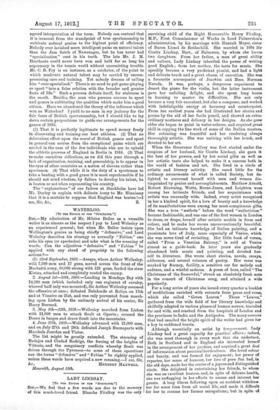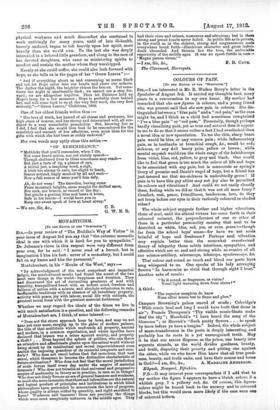LADY LINDSAY. [To TER Emma or TES .EprourOz."] SIR, — We feel
that a few words are due to the memory of this much-loved friend. Blanche FitzRoy was the only surviving child of the Right Honourable Henry FitzRoy, M.P., First Commissioner of Works in Lord Palmerston's administration, by his marriage with Hannah Meyer, sister of Baron Lionel de Rothschild. She married in 1864 Sir Coutts Lindsay, Bart., of Balcarres, by whom she leaves two daughters. From her father, a man of great ability and culture, Lady Lindsay inherited the power of writing good English ; from her mother, the taste for music. She speedily became a very proficient pianist, and had a light and delicate touch and a great charm of execution. She was a favourite accompanist of Joachim and Mme. Norman Neruda. It was, perhaps, a dangerous experiment to desert the piano for the violin, but the latter instrument gave her unfailing delight, and she spent long hours in learning to master its difficulties. She not only became a very fair executant, but also a composer, and worked with indefatigable energy at harmony and counterpoint. From her earliest years she had illustrated her stories and poems by the aid of her facile pencil, and showed an extra- ordinary neatness and delicacy in her designs. As she grew older she began to paint in water-colours, and acquired great skill in copying the fine work of some of the Italian masters. Her colouring was beautiful and her rendering always thoroughly artistic. She was untiring with her brush, and devoted to her art.
When the Grosvenor Gallery was first started under the auspices of her husband, Sir Coutts Lindsay, she gave it the best of her powers, and by her social gifts as well as her artistic taste she helped to make it a success both in the world of fashion and art. She lived in a circle of artistic and literary activity. She cared little for the ordinary amusements of what is called Society, but de- lighted to surround herself with men and women dis- tinguished by genius and accomplishments. Matthew Arnold, Robert Browning, Watts, Burne-Jones, and Leighton were among her intimate friends, and her acquaintance with artists was unusually wide. Indeed, every artist recognized in her a kindred spirit, for a love of beauty and a knowledge of its manifestations were among her most conspicuous gifts. She was a true "'esthete" before the word "a3stheticism" became fashionable, and was one of the first women in London to dress, or drape, herself after artistic models in form and colour, and to make her rooms unconventionally beautiful. She had an intimate knowledge of Italian painting, and a passionate love of Italy, more especially of Venice, which she was never tired of revisiting. Her little book of verses. called " From a Venetian Balcony," is sold at Venice almost as a guide-book. In later years she gradually abandoned both music and painting, and devoted her.. self to literature. She wrote short stories, novels, essays, addresses, and several volumes of poetry. Her verse was marked by fluency, facility, a sensitive ear for melody and cadence, and a wistful sadness. A poem of hers, called "The Christmas of the Sorrowful," struck an absolutely fresh note in the concert of Christmas song, and attained a wide popularity.
For a long series of years she issued every quarter a booklet of meditations enriched with extracts from prose and verse, which she called " Green Leaves." These " Leaves," gathered from the wide field of her literary knowledge and skilfully adapted to various phases of human sorrow, travelled far and wide, and reached from the hospitals of London and the provinces to India and the Antipodes. The many sorrows that had assailed the bright spirit of the writer had given her a key to saddened hearts. Although essentially an artist by temperament, Lady
Lindsay had a great capacity for practical affairs ; indeed, she was most thorough in every work that she undertook. Both in Scotland and in England she interested herself
in the arrangement of her gardens, and acquired a great deal of information about practical horticulture. She loved colour
and beauty, and was formed for enjoyment; her power of
repartee, her sense of humour, her love of pare fun had, in the old days, made her the centre of a joyous and distinguished circle. She delighted in entertaining her friends, to whom she was an excellent hostess, and, in spite of delicate health, she was El unflagging in her efforts to amuse and interest her guests. A long illness following upon an accident withdrew her for some time from all social life, and made it difficult for her to resume her former occupations; but in spite of
physical weakness and much discomfort she continued to work untiringly for many years, until of late ill-health, bravely endured, began to tell heavily upon her spirit, more heavily than she would own. To the last she was deeply interested in a beloved little grandson, and clung to the care of her devoted daughters, who came as ministering spirits to comfort and sustain the mother whom they worshipped.
Keenly as she could suffer, she could also look forward with hope, as she tells us in the pages of her " Green Leaves"
And if everything about us and concerning us seems black and sad, let Hope enter into our hearts and cheer our sadness. The darker the night, the brighter shines the beacon. Yet some- times the night is unutterably dark ; we cannot see a step for- ward ; we are altogether hopeless. Then let Patience hold up Hope's lamp for a few moments ; Hope is probably close behind her, and will come back to us at the very first word, the very first entreaty."—" Green Leaves," Christmas, 1909.
One of her oldest friends writes thus :—
" Her love of truth, her hatred of all shams and pretences, her high sense of honour, and her strong and determined will, all con- duced to a very remarkable personality. But, knowing her as I did, I feel that she would love best to be remembered for the constancy and warmth of her affections, even more than for the gifts with which she had been so richly endowed."
Her own words may aptly close this notice
"OF REMEMBRANCE."
"Methinks that you'll remember, when I die,
Not some brave action, nor yet stately speech—
Though sheltered lives to these sometimes may reach--• But just a turn of lip, a glance of eye, A trivial jest, a laughing word, a sigh, A trick too strong to cure, too slight to teach,
Scarce noticed, haply mocked by all and each—
Now a full source of tears you'd fain defy.
Ah, do not weep ! The traveller, having come From mountain heights, cares naught for drifted snow,
Nor rock, nor branch, as record of the day : But plucks a gentian blue and bears it home, Safe in his bosom—I would have you so Keep one sweet speck of love at heart alway."
—We are, Sir, &c.,
C. B.
G. W. E. R.







































 Previous page
Previous page